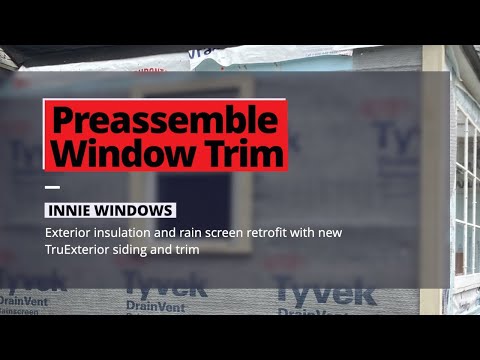The last time we watched a video in this series, we were looking at the canned foam air seal inside the new window on this old wall.
Before that, we flashed it into the WRB after installing the flanged window. Before we could install it, though, we had to flash the rough opening, which we reframed after removing the original window frame.
Before that, we surgically removed the exterior foam without cutting the WRB, and we removed the 25-year-old replacement window that was sitting there, minding its own business.
To get after the exterior insulation and replacement window, we had to remove the exterior trim.
But it all started with a window in a wall in a house. In this video, we’ll make this look like this, then compare it to this.
The first thing he does is replace the foam jigsaw puzzle pieces he surgically removed a couple of episodes back.
Because the new window is bigger than the old window, some of the foam can be cut back. He cut the width down from the inside because the window got bigger.
He then chucks the scraps on the ground because he knows the camera guy will chuck them in the trash.
He pieces the parts back in and tapes the seams.
Now he figures out where the trim will end up, and he marks the siding to be cut back.
He doesn’t bother to square a line from the level to the beveled siding because there is zero chance it will be correct, so he ticks the high spots of the siding that are in direct contact with the level.
At the bottom, he checks to see if the marks still represent the reality he is looking for, and then he uses his speed square to complete the lines before cutting the siding back.
Before cutting, check for nails on the cutline and remove them, but…
David: Sometimes you just cut through ‘em.”
And he finishes the cuts with a multitool.
Now he measures for the trim pieces, and he goes over to his cordless woodshop where the sill and jamb extensions are cut to length, ripped to size, and screwed together.
And just like it grew there, he slips the extension frame into place.
He marks the siding for one last cut and primes the newly exposed edges of the wood siding.
Finally, he slides the casing into place and screws it into the extension jambs.
Before installing the head casing, he cuts a piece of flashing to size and slides it in place behind the furring strips above.
He can’t tape the top of the flashing to the foam, which is the drainage plane. But most of the water that may leak into the wall will be directed out with this flashing.
Because he just opened the wall up and inspected the inner layers, David is pretty confident that there’s not a whole lot of water leaking in, and this is going to be fine.
Because the trim is made of PVC, it will never rot.
And because the window is perfectly flashed into the WRB behind the foam, no water is getting into that opening—it’ll just dribble out the front.
So with the head flashing tucked in place, he slides the head casing in place, using the old putty-knife prybar trick to fit it tightly into place.
Screw holes are filled with Cortex plugs, and just like that, we have a new window in a hundred-year-old wall that was upgraded 25 years ago.
Recapturing the space left by the old weight pockets and window frame, we were able to get more glass area, better insulation, and better performance out of this old hole.
This video series was shot on location at the home of Betsy Pettit and Joseph Lstiburek, also known as Building Science Summer Camp HQ











